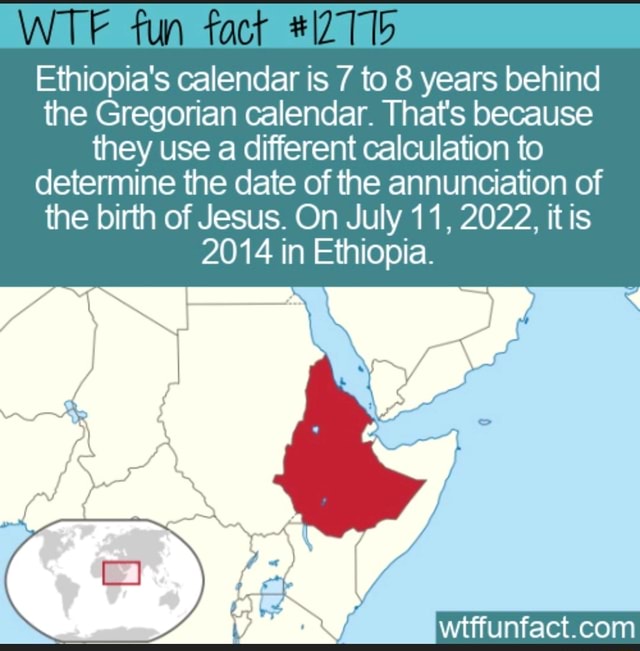Ethiopia, like the U.S. and much of the Western world, uses a solar calendar. Also like most Western nations, Ethiopia's calendar is rooted in Christianity, with year one starting with the birth of Jesus Christ. However, Ethiopia calculates Jesus's birth as a different date.Not only that – the Ethiopian calendar is also seven years and eight months behind the Western calendar, making Saturday the start of 2014. This is because it calculates the birth year of Jesus Christ differently. When the Catholic Church amended its calculation in 500 AD, the Ethiopian Orthodox Church did not.Based upon the ancient Coptic Calendar, the Ethiopian Calendar is seven to eight years behind the Gregorian Calendar, owing to alternate calculations in determining the date of the annunciation of the birth of Jesus.
Why is the year different in Ethiopia : To indicate the year, followers of the Ethiopian and Eritrean churches today use the Incarnation Era, which dates from the Annunciation of the Incarnation of Jesus on 25 March AD 9 (Julian), as calculated by Annianus of Alexandria c. 400; thus, its first civil year began seven months earlier on 29 August AD 8.
What country is 7 years behind
Ethiopia
Unlike the Western Gregorian calendar with 12 months, Ethiopia follows a 13-month calendar, placing it seven years behind. The Ethiopians welcomed the new millennium on September 11, 2007, adhering to a calendar dating back to 525 AD, preceding the Roman church's amendment.
What country has 13 months : Ethiopian
An Ethiopian year is comprised of 13 months, and is seven years behind the Gregorian calendar. In fact, Ethiopians celebrated the new millennium on September 11, 2007; this is because the Ethiopians continued with the same calendar that the Roman church amended in 525 AD.
Ethiopia
Unlike the Western Gregorian calendar with 12 months, Ethiopia follows a 13-month calendar, placing it seven years behind. The Ethiopians welcomed the new millennium on September 11, 2007, adhering to a calendar dating back to 525 AD, preceding the Roman church's amendment. The Ethiopian calendar consists of 13 months, where the first 12 months have 30 days each. The 13th month has 5 days in a common year and 6 days in a leap year.
What is Ethiopia’s 13 month called
Pagume
Pagume, the 13th month in Ethiopian calendar, comes. from the Greek word epagomene, which means 'days. forgotten when a year is calculated'.Long story short, the Ethiopian calendar is based on the ancient Coptic calendar and is seven years and eight months behind the Gregorian calendar, due to alternate calculations in determining the birth date of Jesus.Its time difference with the rest of the world is measured not in hours or even days, but in years. Owing to its unique calendar, Ethiopia is, at any given time, between seven and eight years ”behind” most other countries, which use the Gregorian calendar. Within its borders, the year is currently 2016. As the clock strikes midnight and heralds the arrival of January 1, 2024, Kiribati, a country in Oceania, takes the lead in welcoming the New Year. Specifically, Kiritimati Island, also known as Christmas Island, part of Kiribati, will be the first to embrace the new dawn.
Which country is still in 2016 : Ethiopia
Owing to its unique calendar, Ethiopia is, at any given time, between seven and eight years ”behind” most other countries, which use the Gregorian calendar. Within its borders, the year is currently 2016.
Which country is 8 years back : Ethiopia Is About 8 Years Behind Most of the World — Here's Why.
Do any countries have 13 months
An Ethiopian year is comprised of 13 months, and is seven years behind the Gregorian calendar. In fact, Ethiopians celebrated the new millennium on September 11, 2007; this is because the Ethiopians continued with the same calendar that the Roman church amended in 525 AD. The Julian calendar has 12 months of 30 days and then the 13th month makes up the extra day each year (usually 5 or 6 days). The Ethiopian calendar is 7 years behind the Gregorian.The time zone that is farthest behind is Baker Island Time (BIT; UTC-12), the time on Baker and Howland Islands. However, those islands are officially uninhabited. The inhabited time zones that are farthest behind are American Samoa Standard Time (SST) and Niue Time (NUT).
Which country is No 1 in world : Top 10 Biggest economies of the world
Antwort Why is it 2014 in Ethiopia? Weitere Antworten – Why is Ethiopia stuck in 2014
Ethiopia, like the U.S. and much of the Western world, uses a solar calendar. Also like most Western nations, Ethiopia's calendar is rooted in Christianity, with year one starting with the birth of Jesus Christ. However, Ethiopia calculates Jesus's birth as a different date.Not only that – the Ethiopian calendar is also seven years and eight months behind the Western calendar, making Saturday the start of 2014. This is because it calculates the birth year of Jesus Christ differently. When the Catholic Church amended its calculation in 500 AD, the Ethiopian Orthodox Church did not.Based upon the ancient Coptic Calendar, the Ethiopian Calendar is seven to eight years behind the Gregorian Calendar, owing to alternate calculations in determining the date of the annunciation of the birth of Jesus.
Why is the year different in Ethiopia : To indicate the year, followers of the Ethiopian and Eritrean churches today use the Incarnation Era, which dates from the Annunciation of the Incarnation of Jesus on 25 March AD 9 (Julian), as calculated by Annianus of Alexandria c. 400; thus, its first civil year began seven months earlier on 29 August AD 8.
What country is 7 years behind
Ethiopia
Unlike the Western Gregorian calendar with 12 months, Ethiopia follows a 13-month calendar, placing it seven years behind. The Ethiopians welcomed the new millennium on September 11, 2007, adhering to a calendar dating back to 525 AD, preceding the Roman church's amendment.
What country has 13 months : Ethiopian
An Ethiopian year is comprised of 13 months, and is seven years behind the Gregorian calendar. In fact, Ethiopians celebrated the new millennium on September 11, 2007; this is because the Ethiopians continued with the same calendar that the Roman church amended in 525 AD.
Ethiopia
Unlike the Western Gregorian calendar with 12 months, Ethiopia follows a 13-month calendar, placing it seven years behind. The Ethiopians welcomed the new millennium on September 11, 2007, adhering to a calendar dating back to 525 AD, preceding the Roman church's amendment.

The Ethiopian calendar consists of 13 months, where the first 12 months have 30 days each. The 13th month has 5 days in a common year and 6 days in a leap year.
What is Ethiopia’s 13 month called
Pagume
Pagume, the 13th month in Ethiopian calendar, comes. from the Greek word epagomene, which means 'days. forgotten when a year is calculated'.Long story short, the Ethiopian calendar is based on the ancient Coptic calendar and is seven years and eight months behind the Gregorian calendar, due to alternate calculations in determining the birth date of Jesus.Its time difference with the rest of the world is measured not in hours or even days, but in years. Owing to its unique calendar, Ethiopia is, at any given time, between seven and eight years ”behind” most other countries, which use the Gregorian calendar. Within its borders, the year is currently 2016.

As the clock strikes midnight and heralds the arrival of January 1, 2024, Kiribati, a country in Oceania, takes the lead in welcoming the New Year. Specifically, Kiritimati Island, also known as Christmas Island, part of Kiribati, will be the first to embrace the new dawn.
Which country is still in 2016 : Ethiopia
Owing to its unique calendar, Ethiopia is, at any given time, between seven and eight years ”behind” most other countries, which use the Gregorian calendar. Within its borders, the year is currently 2016.
Which country is 8 years back : Ethiopia Is About 8 Years Behind Most of the World — Here's Why.
Do any countries have 13 months
An Ethiopian year is comprised of 13 months, and is seven years behind the Gregorian calendar. In fact, Ethiopians celebrated the new millennium on September 11, 2007; this is because the Ethiopians continued with the same calendar that the Roman church amended in 525 AD.

The Julian calendar has 12 months of 30 days and then the 13th month makes up the extra day each year (usually 5 or 6 days). The Ethiopian calendar is 7 years behind the Gregorian.The time zone that is farthest behind is Baker Island Time (BIT; UTC-12), the time on Baker and Howland Islands. However, those islands are officially uninhabited. The inhabited time zones that are farthest behind are American Samoa Standard Time (SST) and Niue Time (NUT).
Which country is No 1 in world : Top 10 Biggest economies of the world